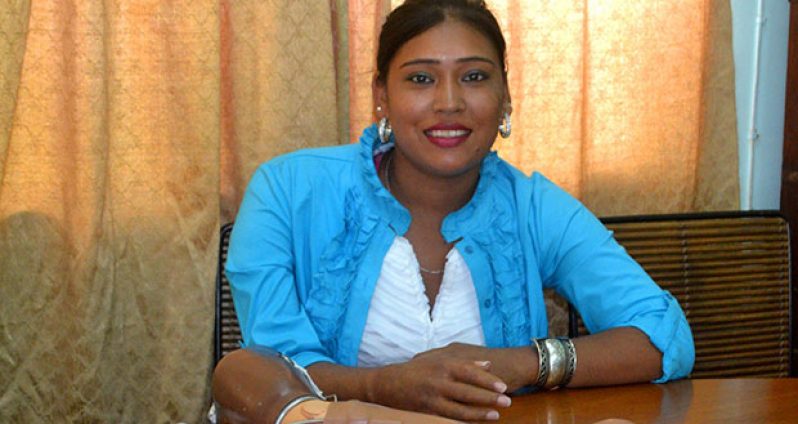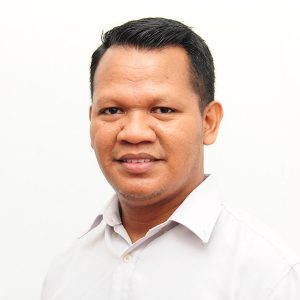–Domestic violence survivor talks plans for the future
SITTING confidently in front of the cameras, Natasha Houston said she is embarking on a new chapter in her life, one that will see her spreading awareness to victims of abuse and those in abusive relationships.She told reporters yesterday, at the Help and Shelter Headquarters on Homestretch Avenue, that she wants to bring about a change in the society, whereby she would educate persons on the benefits of speaking out while in abusive relationships, and she wants to seek assistance in the form of counselling from Help and Shelter, the local non-governmental organisation which took her under its wing soon after her life had been brutally threatened, around 18:00hrs on July 31, 2013.
On that day, her late husband Richard Lord almost killed her during a chilling episode which lasted for minutes and left her two children, Kimberly Houston, 5, and Saif Amad Lord, 2, dead at their Lot 867 Zeelugt North, East Bank Essequibo home. Lord later committed suicide.
As this publication reported last December, Natasha has seen her daughter die, has had shadows of her own death, and has felt her son’s death. As a mother, she fought with one hand, in blood and pain, to save her two-year-old boy; but as she ran to open the door for his safe escape, her berserk husband chopped the fingers off her left hand after severing her right hand, as he displayed his horribly brutish nature and took her a few steps closer to the end.
A CHANGED PERSON
But today she is a changed person. Natasha benefited from the assistance of several private entities and individuals, including Help and Shelter’s co-founder Denise Dias, who came to her aid in August 2013 when she was just 21 years old.
Dias, who was present yesterday during the press briefing, said she realised that the young woman had within her the strength and courage to continue on her path to a better life. Dias said that after the injuries to her hands had healed, Natasha was taken to the Ptolemy Reid Rehabilitation Centre for treatment and to assess whether she could be outfitted with artificial limbs. However, her injuries were deemed too severe, as she’d lost her entire right hand, from the shoulder down. She’d also lost three fingers on her left hand.
Dias said Natasha’s journey to rehabilitation eventually began in June 2014, when she made several connections with persons overseas.
Help came by way of the provision of meals; an apartment for Natasha to stay in while in the United States; the provision of airline tickets, courtesy of Fly Jamaica; and from a host of corporate entities here and overseas.
Eventually, Natasha was ready to meet her “dream team”, Progressive Orthotics and Prosthetics Group of New York. Today, she boasts a prosthetic arm which is mechanically operated, as well as a spare which is more cosmetic in nature. In addition, her left hand has been fitted with a prosthetic glove; hence Natasha appears as normal as ever. The cost of rehabilitation, inclusive of accompanying expenses such as accommodation and food, is in the vicinity of G$9M.
IN HIGH SPIRITS
Natasha was upbeat when she spoke yesterday. She made the headlines recently, both here and in the US, when her story hit the news.
Although she is getting used to the heavy mechanical hand, she expressed confidence as she spoke about her experience.
She detailed that following the brutal incident, she stayed at home most of the time, locked away in her room. It was almost a continuation of the abuse she’d endured at the hands of her husband, who had never allowed her to leave their home, listen to the radio, or even socialise.
“I don’t want it to happen to somebody else, so if I could share my experience with someone else, I could bring them out of that abusive relationship,” she said.
Today, she is able to travel on her own, and she happily noted that she had travelled yesterday all the way to Homestretch Avenue from her Tuschen, East Bank Essequibo home all by herself.
This contrasts with her recent past. “People use to look at me every time I go somewhere,” she said. “I feel more comfortable now, because before I could not do anything for myself; I feel more acceptable to society. Where before I used to always stay home, now I can come out and see different places…,” she expressed.
And while she does not have any plans to restart a family, she has an important message for victims of abuse: “My message is don’t isolate yourself; speak out! Because, the more you isolate yourself is the more you are going to feel down; don’t lock away yourself,” she said.
Meanwhile, Help and Shelter Coordinator Margaret Kertzious noted that the NGO has its work plans crafted and in motion in several areas, including communities in Regions 3 and 4 and at Kwakwani. However, it remains strapped for cash, and though it sets out to cover its mandate, the financial sums are beyond the organization to fully carry out its duties.
She said the NGO’s doors are always open to the public, including for counselling, which she noted is always available.





.jpg)








